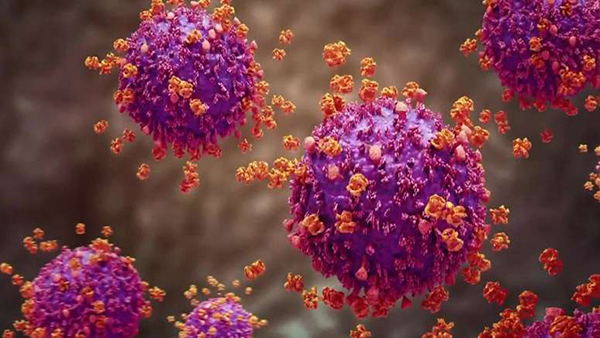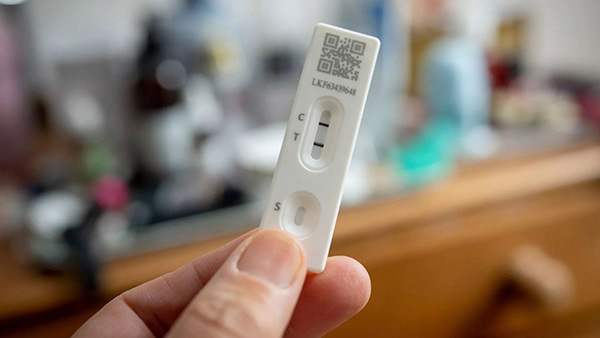
Covid-19 Wikipedia

Covid-19 Wikipedia
Six years since the onset of Covid 19 and its variants - theories about its origins are still inconclusive. may have multiple origins, and may never be known. Ellie's Origin Theories of Covid
Arguments for and against vaccines vary. For the most part they have been effective - though some attribute that to Covid variants beings less severe.
Emphasis remains on the study of Long Covid and its physical and psychological effects.
I believe Covid in any form has consciousness and an agenda. It behaves like artificial intelligence entering the body and exacerbating one's weaknesses - emotional and/or physical.
Body, mind and soul connection
Covid takes us to depression, anxiety and autoimmune diseases. On a soul level the person needs/wants to do nothing and be taken care of for a period of time or perhaps forever. It's burnout no matter how good their life is. Burnout is part of End Times in the simulation of our reality. Simply put the person is having a mini-breakdown from which they should recover partially or totally. Actually you don't need covid to have a mini-breakdown. It happens all the time in end times.
Scientists Find New Immune Clue Behind Long COVID's Lingering Symptoms SciTech Daily - February 5, 2026
'Zombie' Remnants of COVID-19 Hunt In Packs And Kill Our Immune Cells Science Alert - February 5, 2026
Millions of Us Have Likely Lost Our Smell Without Even Realizing It After COVID Science Alert - October 17, 2025

The impacts of the ongoing COVID-19 pandemic continue to be felt across the world, but some consequences are more noticeable than others. New research suggests a large proportion of people may have lost their sense of smell after catching COVID-19, without even realizing it.
Scientists find key reason why loss of smell occurs in long COVID-19. The inflammatory mechanism could also help explain other long COVID-19 symptoms Science Daily - December 21, 2022
The reason some people fail to recover their sense of smell after COVID-19 is linked to an ongoing immune assault on olfactory nerve cells and an associated decline in the number of those cells, scientists report. While focusing on the loss smell, the finding also sheds light on the possible underlying causes of other long COVID-19 symptoms - including generalized fatigue, shortness of breath, and brain fog - that might be triggered by similar biological mechanisms.
Brain Deficits After Severe COVID-19 Can Equate To 20 Years Of Normal Aging IFL Science - September 24, 2024
The Risk Factors For Long COVID Have Finally Been Revealed Science Alert - June 24, 2024
Long COVID was found to be more common in women, and those with previous cardiovascular disease issues. It was also less common in those who had been vaccinated, and in people with the less severe Omicron variant of the infection. While some health conditions like chronic obstructive pulmonary disease and a history of smoking were linked to longer recovery times, these became insignificant once other risk factors were also factored in. Severe infections and longer recovery times were also found to be more common in American Indian and Alaska Native participants, adding to what we already know about racial and ethnic disparities with COVID-19.
Long COVID Seems to Be a Brain Injury, Scientists Discover Science Alert - February 15, 2024
Some form of brain injury could be behind the symptoms reported by those with long COVID, according to a new study, and adapting tests and treatments to match could aid progress in tackling the condition. Analyzing 203 patients hospitalized with COVID-19 or its associated symptoms, and comparing the results with 60 people without the infection, researchers noticed elevated levels of four brain injury biomarkers - key signs of biological change - in those infected with COVID-19.
NIH launches long COVID clinical trials through recover initiative NIH.gov - August 1, 2023

Trials will focus on:
2. SARS-CO-V-2 Persistence - Immune system stops working properly or damages organs
3. Sleep Disorders
4. Dysfunction of the Autonomic Nervous System - which controls bodily functions like heart rate, breathing, and the digestive system
Covid hits the physical and emotional body based on one's pre-existing conditions - exacerbating them. Long Covid gives the person whatever they emotionally need in terms of professional help and just good old fashion rest as people burn out in end times.
Covid hits the physical and emotional body based on one's pre-existing conditions - exacerbating them. Long Covid gives the person whatever they emotionally need in terms of professional help and just good old fashion rest as people burn out in end times.
Other Covid Research
Scientists at Washington University in St. Louis have developed a new test for Covid that gives results in less than one minute by breathing once or twice into a small hand-held device. They are hoping the test could be modified to detect other viruses such as flu and RSV. Another company has built an air monitor that can detect these viruses in public places in under five minutes. - NIH.gov - August 1, 2023
Genetic quirk could explain why not everyone shows symptoms of COVID-19 Live Science - July 20, 2023

Fever, shortness of breath and cough are all key COVID-19 symptoms we've been told to look out for throughout the pandemic. However, at least 1 in 5 people who test positive for the virus don't develop any symptoms, and the reason why has remained a mystery - until now.
Long Covid Brain Changes Mirror Those of Chronic Fatigue, Brain Scans Reveal Science Alert - March 29, 2023
Chronic fatigue syndrome is an auto immune disease. Long COVID and chronic fatigue syndrome both seem to impact the oldest parts of the brain in a curiously similar fashion.
'Extinct' Coronaviruses Still Thrive in North America, Just Not in Humans Science Alert - February 7, 2023
Variations in the SARS-CoV-2 virus that have not been detected in human beings for some time are still going strong in animal populations - specifically, in the white-tailed deer (Odocoileus virginianus) roaming across the state of New York in the US.
Examining COVID-19's long-term effects on the innate immune system Medical Express - January 23, 2023
Our immune system has two parts: the innate immune system and the adaptive immune system. The reaction of the innate system is quick but unspecific. The adaptive, specific, immune system is activated later, when there is an infection, and learns to attack viruses and bacteria that the body has encountered. The specific immune system also functions as a memory, so that the infection can be beaten much quicker the next time we encounter the same pathogen. In this study, the researchers have taken a closer look at the innate immune system, which is necessary for the body to organize any specific immune defense at all.
COVID Autopsies Reveal The Virus Spreading Through The 'Entire Body' Science Alert - January 9, 2023
COVID-19 is defined as a respiratory infection, but the effects of the novel coronavirus are certainly not confined to any one organ.
Dozens of recent autopsies show persistent evidence of SARS-CoV-2 throughout the body, including in the lungs, the heart, the spleen, the kidneys, the liver, the colon, the thorax, muscles, nerves, the reproductive tract, the eye, and the brain.
Study identifies four major subtypes of long COVID Medical Express - January 4, 2023
Of the four major patterns detected, one featured heart and kidney problems, and included a relatively high proportion of patients infected in the first few months of the pandemic in the U.S. Another pattern included respiratory problems, anxiety, sleep disorders and other symptoms including headache and chest pain; nearly two-thirds of the patients with this pattern were women.